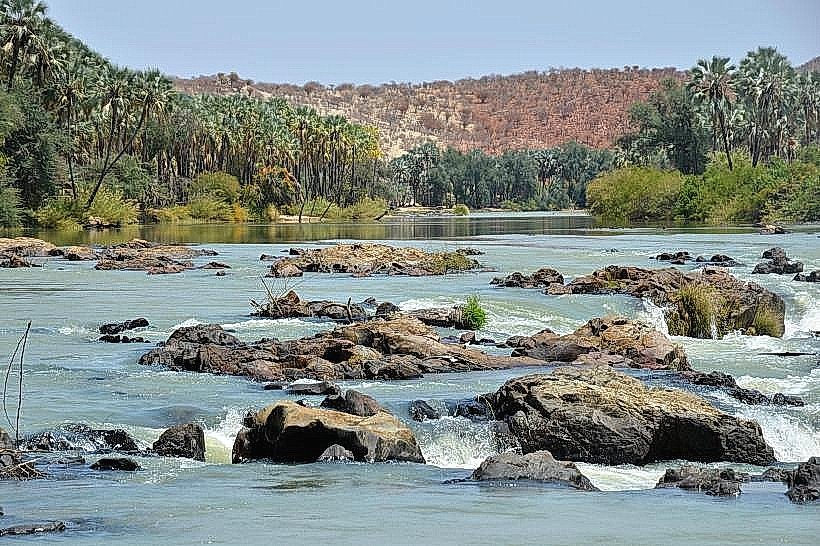Information
City: CuneneCountry: Angola
Continent: Africa
Cunene, Angola, Africa
Cunene is a province in southern Angola bordering Namibia. Its capital is Ondjiva. The region is defined by its flat semi-arid plains, the vital Cunene River, and a resilient pastoralist culture that navigates frequent cycles of extreme drought and seasonal flooding.
Historical Timeline
Historically the heartland of the Kwanyama kingdom. A critical historical event occurred in 1915 with the Battle of Mufilo, where the Portuguese military decisively defeated the Kwanyama resistance led by King Mandume ya Ndemufayo. During the Angolan Civil War and the South African Border War, Cunene was a major theater of conflict, suffering extensive destruction during South African military incursions (Operations Protea and Askari). In 2026, it is the focus of the "Cafu Canal" project, the largest water infrastructure initiative in the nation’s history.
Demographics & Population
The 2026 estimated population is approximately 1.2 million. The population is predominantly Ovambo (Kwanyama), with significant Herero and Himba groups. Portuguese is the official language, but Oshikwanyama is the primary language of daily life. The economy is driven by Livestock (Cattle), Cross-border Trade, and Subsistence Agriculture.
Urban Layout & Key Districts
The province is sparsely populated, with activity concentrated along the EN-100 highway.
Ondjiva: The administrative and commercial capital, rebuilt extensively after 2002.
Santa Clara: A vital border town and customs post directly adjacent to Oshikango, Namibia.
Humbe: A historic town known for its strategic bridge over the Cunene River.
Xangongo: A major logistical node and agricultural center.
Top Landmarks
King Mandume Memorial Complex: Located in Oihole, it commemorates the last king of the Kwanyama.
The Cafu Canal: A 160-km canal system designed to transport water from the Cunene River to drought-stricken regions.
Cunene River: The primary life-source of the province, forming the border with Namibia.
Ruacana Falls: (On the border); a massive waterfall and hydroelectric dam system.
Xangongo Bridge: A critical engineering link connecting southern Angola to the rest of the country.
Transportation Network
Ondjiva Pereira Airport (XNG) provides regular domestic flights to Luanda and Lubango. The EN-100 highway is the primary artery, serving as the main trucking route for goods entering Angola from South Africa via Namibia. Within towns, motorcycle taxis are the dominant form of transit.
Safety & Health
Cunene is generally safe, though the border areas at Santa Clara are prone to smuggling-related petty crime. The primary health risk is Malaria and waterborne diseases during the flood season (efundja). In 2026, many areas are still recovering from the 2019-2021 drought, and food security remains a priority for local government.
Digital & Financial Infrastructure
4G connectivity is stable in Ondjiva and Santa Clara via Unitel. The Kwanza (AOA) is the currency, but the Namibian Dollar (NAD) and South African Rand (ZAR) are frequently used in informal border trade. ATMs are concentrated in Ondjiva and Santa Clara.
Climate & Ecology
BSh (Semi-arid) climate. The region is characterized by Mopane woodlands and vast floodplains. In 2026, climate change has intensified the "boom and bust" cycle of the efundja floods, which provide essential nutrients to the soil but often displace thousands.
Culture & Social Norms
The culture is centered on Cattle. Wealth and social status are measured by herd size. Traditional ceremonies, such as the Efundula (rite of passage), remain central to social life. Social etiquette is conservative and hierarchical. Cuisine focuses on Oshifima (millet porridge) and grilled beef.
Local Cost Index
1 Standard Meal: $6.00–$12.00 USD.
Mid-range Hotel Night: $70.00–$120.00 USD.
Nearby Day Trips
Mupa National Park: (North of Ondjiva); a conservation area primarily established to protect the giraffes and indigenous avifauna.
Oshikango (Namibia): The bustling commercial duty-free zone just across the border.
Facts & Legends
The Baobab trees of Cunene are legendary; many are centuries old and were historically used as hollowed-out shelters or storage units. A local legend tells of King Mandume, who is said to have committed suicide rather than be captured by the Portuguese, symbolizing the eternal spirit of Kwanyama independence. Another fact: the border at Santa Clara is one of the busiest land crossings in Southern Africa, operating 24 hours a day to facilitate the flow of goods into the Angolan interior.


